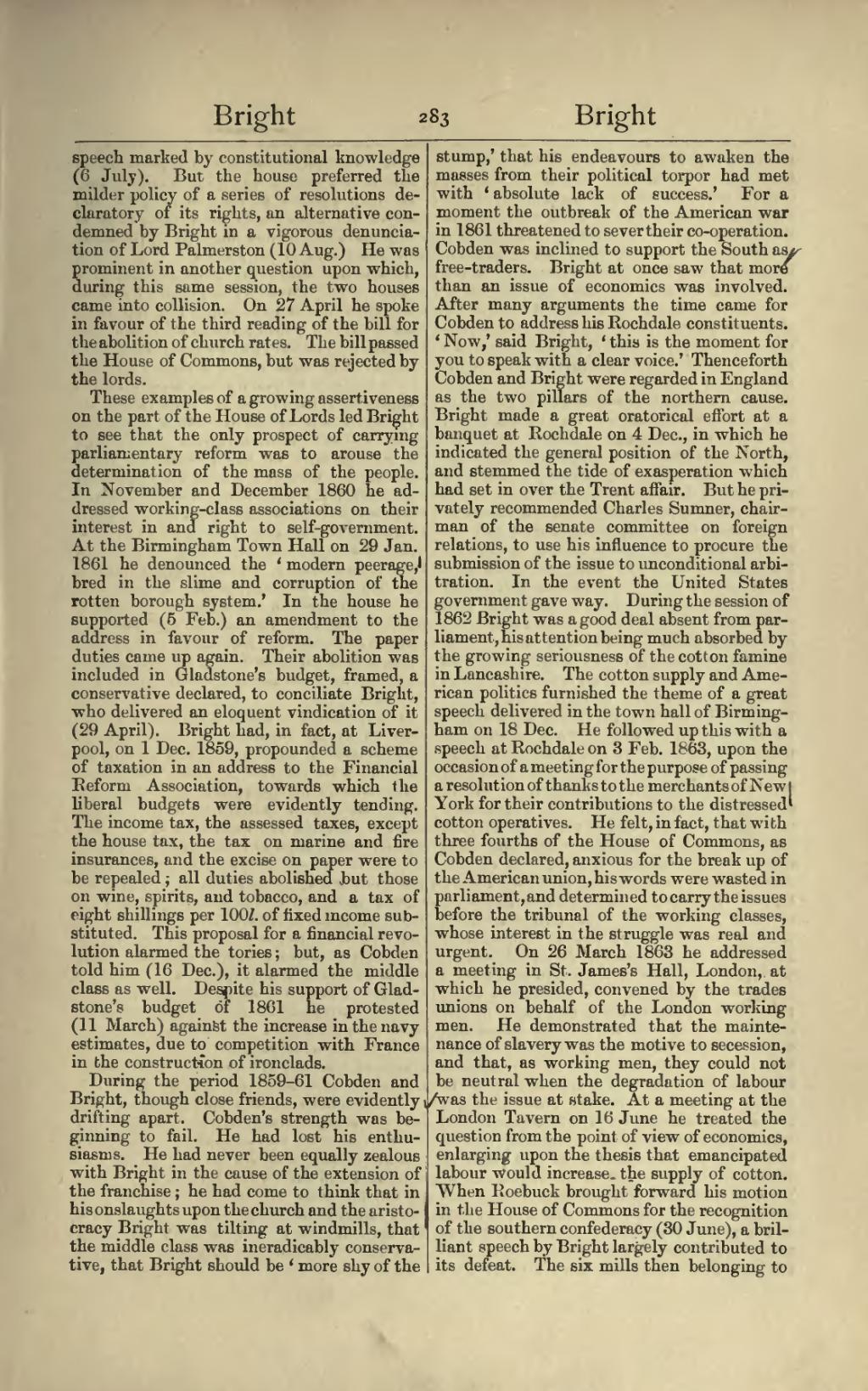speech marked by constitutional knowledge (6 July). But the house preferred the milder policy of a series of resolutions declaratory of its rights, an alternative condemned by Bright in a vigorous denunciation of Lord Palmerston (10 Aug.) He was prominent in another question upon which, during this same session, the two houses came into collision. On 27 April he spoke in favour of the third reading of the bill for the abolition of church rates. The bill passed the House of Commons, but was rejected by the lords.
These examples of a growing assertiveness on the part of the House of Lords led Bright to see that the only prospect of carrying parliamentary reform was to arouse the determination of the mass of the people. In November and December 1860 he addressed working-class associations on their interest in and right to self-government. At the Birmingham Town Hall on 29 Jan. 1861 he denounced the 'modern peerage,' bred in the slime and corruption of the rotten borough system.' In the house he supported (5 Feb.) an amendment to the address in favour of reform. The paper duties came up again. Their abolition was included in Gladstone's budget, framed, a conservative declared, to conciliate Bright, who delivered an eloquent vindication of it (29 April). Bright had, in fact, at Liverpool, on 1 Dec. 1859, propounded a scheme of taxation in an address to the Financial Reform Association, towards which the liberal budgets were evidently tending. The income tax, the assessed taxes, except the house tax, the tax on marine and fire insurances, and the excise on paper were to be repealed; all duties abolished, but those on wine, spirits, and tobacco, and a tax of eight shillings per 100l. of fixed income substituted. This proposal for a financial revolution alarmed the tories; but, as Cobden told him (16 Dec), it alarmed the middle class as well. Despite his support of Gladstone's budget of 186l he protested (11 March) against the increase in the navy estimates, due to competition with France in the construction of ironclads.
During the period 1859-61 Cobden and Bright, though close friends, were evidently drifting apart. Cobden's strength was beginning to fail. He had lost his enthusiasms. He had never been equally zealous with Bright in the cause of the extension of the franchise; he had come to think that in his onslaughts upon the church and the aristocracy Bright was tilting at windmills, that the middle class was ineradicably conservative, that Bright should be 'more shy of the stump,' that his endeavours to awaken the masses from their political torpor had met with 'absolute lack of success.' For a moment the outbreak of the American war in 1861 threatened to sever their co-operation. Cobden was inclined to support the South as free-traders. Bright at once saw that more than an issue of economics was involved. After many arguments the time came for Cobden to address his Rochdale constituents. 'Now,' said Bright, 'this is the moment for you to speak with a clear voice.' Thenceforth Cobden and Bright were regarded in England as the two pillars of the northern cause. Bright made a great oratorical effort at a banquet at Rochdale on 4 Dec, in which he indicated the general position of the North, and stemmed the tide of exasperation which had set in over the Trent affair. But he privately recommended Charles Sumner, chairman of the senate committee on foreign relations, to use his influence to procure the submission of the issue to unconditional arbitration. In the event the United States government gave way. During the session of 1862 Bright was a good deal absent from parliament, his attention being much absorbed by the growing seriousness of the cotton famine in Lancashire. The cotton supply and American politics furnished the theme of a great speech delivered in the town hall of Birmingham on 18 Dec. He followed up this with a speech at Rochdale on 3 Feb. 1863, upon the occasion of a meeting for the purpose of passing a resolution of thanks to the merchants of New York for their contributions to the distressed cotton operatives. He felt, in fact, that with three fourths of the House of Commons, as Cobden declared, anxious for the break up of the American union, his words were wasted in parliament, and determined to carry the issues before the tribunal of the working classes, whose interest in the struggle was real and urgent. On 26 March 1863 he addressed a meeting in St. James's Hall, London,, at which he presided, convened by the trades unions on behalf of the London working men. He demonstrated that the maintenance of slavery was the motive to secession, and that, as working men, they could not be neutral when the degradation of labour was the issue at stake. At a meeting at the London Tavern on 16 June he treated the question from the point of view of economics, enlarging upon the thesis that emancipated labour would increase, the supply of cotton. When Roebuck brought forward his motion in the House of Commons for the recognition of the southern confederacy (30 June), a brilliant speech by Bright largely contributed to its defeat. The six mills then belonging to
